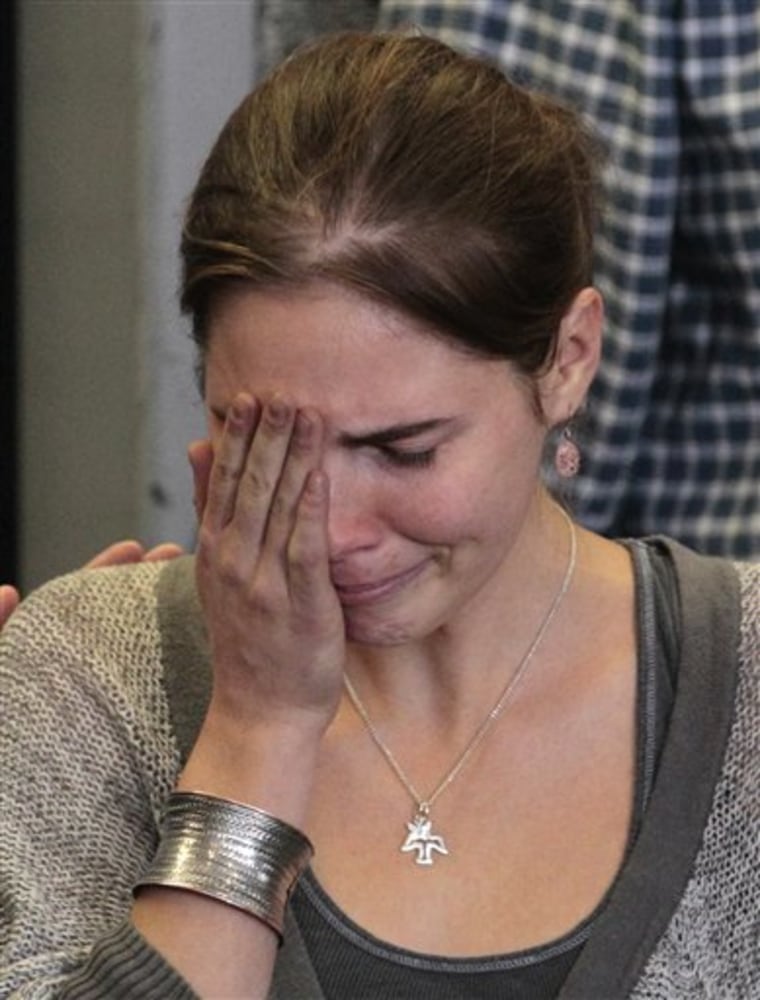The Italian judge who was part of the jury which acquitted Amanda Knox said Wednesday the American and her ex-boyfriend might know the "real truth" about who killed her British roommate.
Judge Claudio Pratillo Hellmann said in a state TV interview that "maybe" the two defendants know what happened in the 2007 slaying of Meredith Kercher in the flat the two women shared in Perugia, the Umbrian town where they were student.
Hellmann, who was also one of the eight jurors, said "the real truth could be different." But based on trial evidence, the jury acquitted them, he said. In Italy, the presiding judge is part of the jury, along with another judge, and six civilians.
In his first public comments since Knox and her Italian co-defendant, Raffaele Sollecito, were acquitted Monday night, the judge stressed on state TV that the verdict was the fruit of the "the truth that was created in the trial."
"But the real truth could be different," Pratillo Hellmann added. "They could also be responsible, but the proof isn't there."
"So maybe they know, too, but as far as we (the jury) go, they didn't," he added.
Speaking of Knox and Sollecito, Pratillo Hellmann told the interviewer: "I felt emotion because they are two young people who suffered, justly or unjustly, I repeat, we can never say with certainty."
Knox and Sollecito have vehemently denied wrongdoing in Kercher's murder. Knox flew home to Seattle on Tuesday, her first full day out of jail since she was arrested a few days after the murder. Sollecito was resting at his family home, his lawyers said.
Asked who knew the truth about the slaying, Pratillo Hellmann referred to a third defendant, Rudy Guede, who was convicted of Kercher's murder in a separate trial and is serving a 16-year sentence in Italy.
"Certainly Rudy Guede" knows, he said. "I won't say he's the only one to know," the judge added.
Referring to Knox and Sollecito, who were both convicted of sexual assault and murder in a the lower court trial, the judge said that "maybe the two defendants also know" what really happened, but "our verdict of acquittal is the result of the truth that was created in the trial."
Guede, of the Ivory Coast, has denied wrongdoing but has acknowledged being in the house when Kercher was slain. The court in convicting Guede indicated in its ruling that he committed the murder along with someone else. But it never said who that was.
The judge described Knox and Sollecito as "two kids barely in their 20s, normal, like so many of today's (youth). Indeed, they were polite, composed, put to the test and matured by this kind of experience."
The judge added that Kercher's family has "all my human compassion."
"But we cannot assign responsibility (for a crime) with such a high penalty solely to ease the suffering of these parents," he said.
The prosecution had sought convictions and life sentences for Knox and Sollecito. Knox had been sentenced to 26 years in prison by the lower court trial, while Sollecito had been given 25 years.
Pratillo Hellmann's comments might hint at the explanation for the verdict which the appeals court must put in writing within three months.
Then the prosecution can decide if it wants to appeal the verdict to Italy's top criminal court. That tribunal, the Court of Cassation, could either uphold the acquittals or throw out the verdict if it should find some technical error, paving the way for a second appeals trial.
Pratillo Hellmann dismissed a suggestion that the jury might have been influenced by the "media circus" surrounding the trial. "You have to rely on your own conscience," he said. "If you are at peace with your conscience, the media circus doesn't have the least impact."
